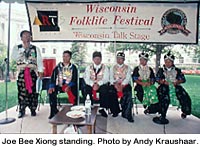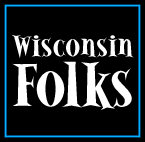|
Home | Search | The Artists | Teaching | Hiring | About This Site | Contact Us |
||||||||||||
|
Traditions In |
Hmong Traditional Music
The qeej is the most cherished instrument of the Hmong people. Qeej players perform at all of the most important Hmong gatherings: weddings, ceremonies for honored visitors, the Hmong New Year celebration (the only Hmong seasonal holiday), and funerals. During traditional Hmong funerals the qeej player must perform ritual dance-songs. These songs guide the soul of the departed backwards through the lands where he or she lived and finally to the home of his ancestors’ spirits. These songs are played on the qeej. Using music to speak words The Hmong language is like many Asian languages. It is tonal. In tonal
languages, the meaning of Another instrument played by Joe Bee was the jar. It is a brass free reed that is plucked in front of the player’s mouth. In the United States, a similar instrument is called the “jaw harp,” and they are sold at most music stores. In Laos, the jar is the instrument traditionally used by teenagers when they date. By changing the position of the jaw, the musician can make the jar “talk.” Listen to Joe Bee give a demonstration. When teenagers talk to one another using the jar, they are not so embarrassed to make the instrument say words like “I like you” or “I love you.” In many ways, Hmong instruments are like instruments you may already know about. In other ways, Hmong music and instruments are very different. In Your Community There is so much to learn about Hmong culture right here in Wisconsin. If you're interested in the Hmong language, seeing photos of young qeej players in action, or a Hmong radio station in your area, you'll find all these and more on the Resources for Students page. Do you already know about a Hmong organization in your area or have friends with Hmong heritage? Learn more from the people around you! |
For Educators: |
||||||||||
|
“As one Hmong man stated, ‘For centuries we have to move (all) over the world because of the wars. Our people move to Laos, Thailand...now France and the U.S. We lose much, we speak different languages. But wherever in the world you are and you see the gheng—you know it’s Hmong.’ ” –Joe Bee Xiong |
||||||||||||
|
Home | Search | The Artists | Teaching | Hiring | About This Site | Contact Us |
||||||||||||


 “...wherever in the world you are and you see the
qeej— you know it’s Hmong...”
“...wherever in the world you are and you see the
qeej— you know it’s Hmong...”